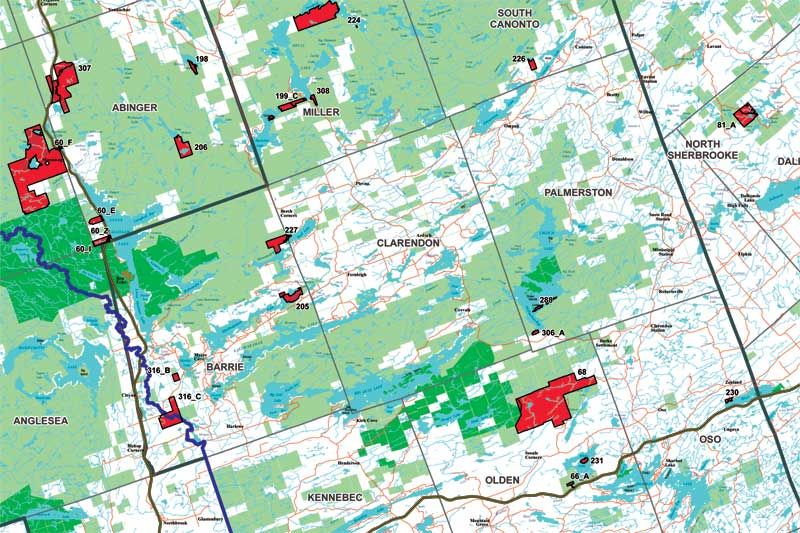Jeff Green | Mar 23, 2016
If the Algonquin Land Claim were a train, you might say it went a bit off the rails last week, just it was rounding the corner towards its destination after a long, arduous journey.
The snag that caused the Council of the Pikwàkanagàn First Nation to “take a step back” from the process, in the words of a press release last Thursday (March 17) were the results of a referendum that was conducted earlier this month.
When asked if they supported the Agreement in Principle for the Algonquin Land Claim, which was negotiated by their Chief and council, and the representatives from nine off-reserve communities, 246 members voted in favour and 317 voted against the agreement, 56% against to 44% in favour.
Pikwàkanagàn Chief Kirby Whiteduck said, “Our members ... are currently divided on the proposed AIP and some do not have the level of comfort to move forward at this moment. As a result, our council requires further discussions and consultations with Canada and Ontario to clarify certain issues, to address the concerns of our members and to bridge the divisions in our community.”
For their part, the Algonquin Nation Representatives and the land claim's Principal Negotiator Robert Potts are prepared to give Pikwàkanagàn Council the time it needs to bridge those divisions.
“We are all supportive of the Algonquins of Pikwàkanagàn as they take the necessary steps to pursue discussions with Canada and Ontario ...” said Clifford Bastien Jr. ,the Algonquin Nation Representative for the Mattawa/North Bay community.
Among the communities in the Mississippi and Madawaska watersheds, the Shabot Obaadjiwan (Sharbot Lake) recorded a 114-5 vote in favour and the Snimikobe (formerly Ardoch Algonquins) recorded a 98-0 vote in favour. The total among the nine off-reserve communities was 3182 in favour and 141 against.
The issue that came up at Pikwàkanagàn in the run-up to the vote was concern over the implications of the AIP as regards self-government, which was a surprise, according to Robert Potts.
“We held extensive meetings throughout the territory and at Pikwàkanagàn after the draft of the AIP was released, and at that time the self-government issue was not raised. It was only in the few weeks preceding the vote that the concern, which was based primarily on misinformation, came up and had an impact on the vote,” he said.
Although he could not completely hide his disappointment about the results of the ratification process, Potts said that the vote was always intended as a non-binding process aimed at identifying issues that need to be addressed, and in that sense it was successful in revealing that the “comfort level among some at Pikwàkanagàn is not where it needs to be. Chief Whiteduck and his council can now address that.”
The other issue that Potts identified as being of concern in Pikwàkanagàn is beneficiary criteria.
“That is something that will have to be finalised before we get to the treaty stage,” said Potts.
While the concept of direct descent from an Algonquin relative, in addition to a connection to an identified Algonquin community, has been used to determine the voters list that was used in the ratification vote, who the ultimate beneficiaries of the claim will be has not been determined.
He said that when a final vote on a land claim treaty is taken, the voting and beneficiary criteria will be identical.
“It will be the beneficiaries who will vote,” he said.
As far as sorting out the issue of self-government at Pikwàkanagàn, Chief Whiteduck indicated last week in an article published in the Eganville Leader, that whether it is tied to the land claim or not, self-government is a priority for his council.
According to research done by Pikwàkanagàn staff, as members inter-marry with non-Algonquins, Pikwàkanagàn will cease to exist within 60 - 70 years because none of its members will have Aboriginal status.
“It would be helpful to further explore self-government and see if we can negotiate and get support for our own constitution under a self-government agreement and determine our own citizenship criteria,” Whiteduck told the Leader.
In an article published in the Frontenac News on March 3, 2016, Greg Sarazin, a former Land Claim negotiator for Pikwàkanagàn now representing a group that opposes the AIP, said that his group is afraid, based on language in the AIP and the statements of federal negotiators, that self government will lead to Pikwàkanagàn losing some of the tax advantages it has under the Indian Act.
“My reading of the AIP, as well as a number of the statements made by negotiators, leads me to be concerned that a commitment to enter self-government negotiations has already been given by Chief and Council and that the terms committed to will extinguish Pikwàkanagàn members' rights and bring an end to Pikwàkanagàn,” he said.
With one side claiming that self-government is the only way for their community to survive, and the other claiming it is a death sentence for their community, it could take some time before a land claim process that is associated with self government to get back on track.
More Stories
- Sticker Shock - EV Charging Station To Cost North Frontenac Township
- 30th Anniversary Verona Car Show
- The Forgotten Comfort Veg - Eggplant
- MERA Stage Comes Alive This Fall
- North Frontenac Council Report - August 27
- Addington Highlands Council Report - September 2
- Here's Grief - Have You Met
- Burn Ban Off in North Frontenac, Addington Highlands - Reduced to Level One in South and Central Frontenac
- The Resurgent Sharbot Lake County Inn and Crossing Pub
- Towards Then End of Trail

